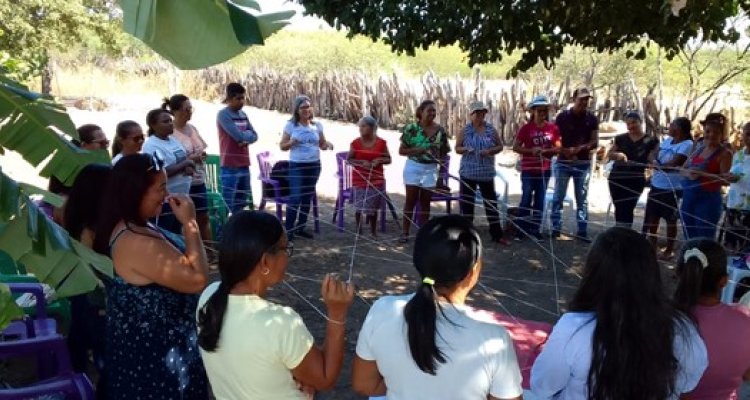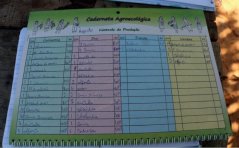
Project
Agroecological Logbooks: Transgressing the reality of rural women in the North-East of Brazil through learning
The feminist and agroecological movement in Brazil and its grassroots innovations focus strongly on collective learning as a way to strengthen women’s movements in isolated rural areas, with it, aiming to for women to transform and transgress their social reality.
Therefore this is an interesting place were activism, critical and collective learning interface with sustainability issues that can help regenerate our current food systems in just and emancipatory ways. The Agroecological Logbooks (ALs) (or Cadernetas Agroecologicas) are a pedagogical-political tool that help reenforcing rural women’s resilience in issues like biodiversity conservation and regeneration, climate change adaptations and mitigation while recognizing and strengthening their crucial role in food sovereignty and solidarity economies. Come and learn with the learning ecology surrounding the Agroecological Logbooks, and join the movement of feminism in agroecology!

Protest made by women during the X Congresso Brasileiro de Agroecologia
Authors photo: Sarah Luiza, Liliam Teles
Rural women face existential challenges of social and ecological justice that require holistic and transformative innovations. In Latin America, where the proposed research is situated, agroecological movements have paved a way for such transdisciplinary work, wherein different epistemic communities with diverging interests and multiple relations to the productive land come together to reflect, learn and act in new ways. Yet, even these kinds of innovations risk reinforcing hegemonic structures, ideas, and practices making such innovations less transformative and radical than they aim to be, especially in the Global South. Therefore, there is a need to develop innovations in agroecology that better set conditions for women to learn, reflect, act, and empower themselves and become transformative agents of their own rural realities. Yet, how this can be done in a fluid and dynamic transdisciplinary context where multiple, often conflicting perspectives are at work, is still obscure.
The Agroecological Logbooks (ALs) play in on this void as an innovation developed by rural women, local NGOs and academics in Brazil to systematize, visualize and revitalize rural women's work in food systems. The Als are embraced as an empowering political and pedagogical tool to challenge the foundations of their oppressive reality and as a driver of transformations in agroecological food systems through reflexivity, learning, and activism. Driven by movements for popular education in agroecology and nested in critical and feminist critical pedagogies and resistance pedagogies the ALs show the potential of feminist grassroots innovations and the way responsibility and emancipation are molded in this transdisciplinary space.

For the first part of my PhD project I will delve into the grassroots innovation of the Agroecological Logbooks (ALs), its integrated collective learning process and its effect on the reality of rural women that use the books and are part of this process. I aim to highlight to what extent and how the Agroecological logbooks motivate women to challenge the daily oppressions they live and transgress the machista reality of rural Bahia, Brazil. Building on theory about transgressive learning and critical feminist pedagogies and using participatory arts based methods (storytelling, film co-production) this part of my PhD project illustrates how, why and when transgressive learning and critical pedagogies play out in practice and how this is experienced by women themselves. Portraying the learning ecology that’s surrounds the Agroecological Logbooks can help better understand to what extent and how transgressive learning through grassroots innovation drive real changes for women on the ground, to not only resist oppressions, but also to transgress reality and construct alternative ways of rural life.
Focusing on the implications of the collective learning ecology that accompanies the grassroots innovation of the agroecological logbooks, I will try to reveal what in this innovations really motivate transgressive learning.
I am to organize 4 workshops that bring together different leaders of the women’s network of Bahia, Brazil. In these workshops I will
- Give background on me, my positionality, the research project, and propose to work together through Arts Based methods
- Reflect on the effects of the learning ecology of the Agroecological Logbooks more generally through a collective photo expositions
- Write a script collectively for 1 or 2 films to me made all together that portray their transgressive learning experience
- Watch our own films and reflect on them
If you feel my work touches upon your interests as well, either methodologically, theoretically, in topic or in practice please don’t hesitate to contact me for sharing a coffee or more.
Video: Agroecological Logbooks - step by step - YouTube
Sites:
All publications of the Agroecological Logbooks in Brazil https://ctazm.org.br/biblioteca/categoria-cadernetas-agroecologicas-48
Results of de Agroecological Logbooks funded project in the northeast of Brazil http://portalsemear.org.br/wp-content/uploads/2020/12/eBook-vers%C3%A3o-ING_Resultados-Cadernetas.pdf
Esther Milberg Muñiz
esther.milberg@wur.nl